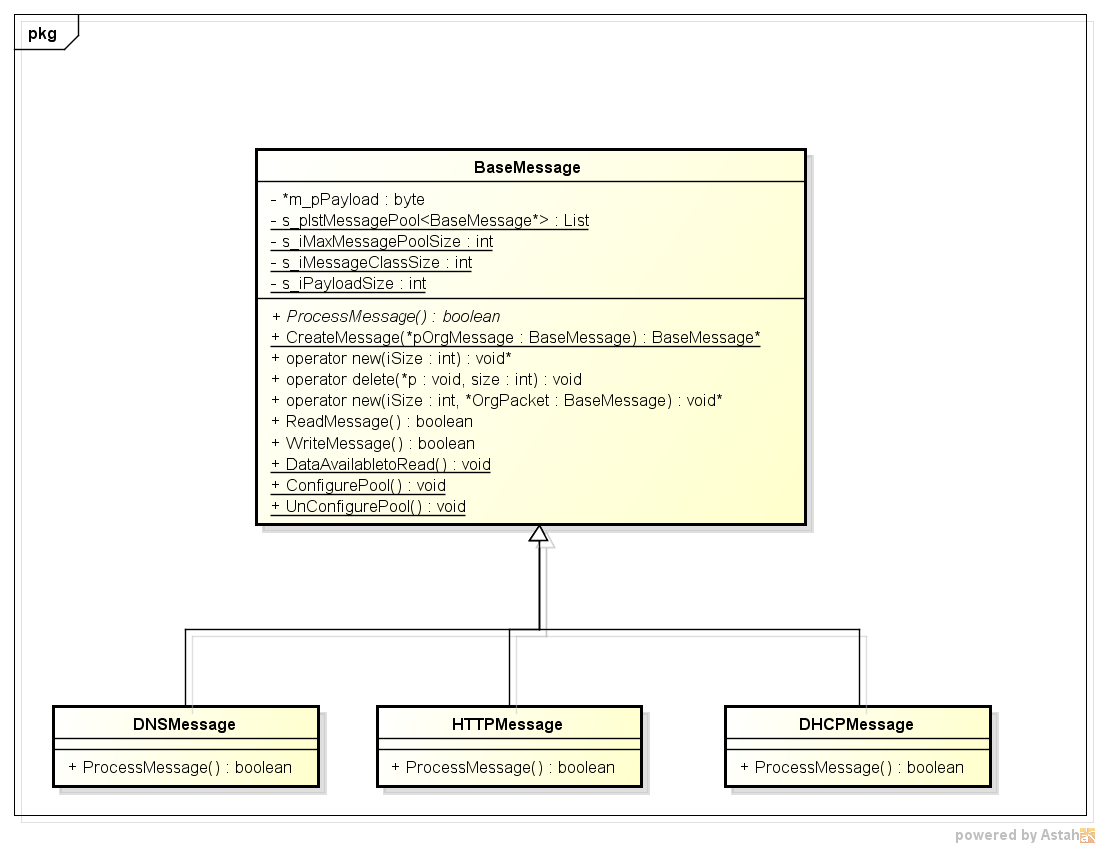Abstract:-
In any application server, allocating/deallocating
memory whiles each and every message processing will consume more CPU cycle. It
will degrade the server performance.
To
solve this problem, need to create Message pool during server startup and use
the messages from pool while processing the requests. Application Server can
process different type of messages. So the message pool needs to be more
generic. This problem also can be solved by OOAD approach.
Problem
Definition:-
Memory allocation and deallocation
always time consuming process in any programing language and Operating system.
Memory allocation/deallocation system
calls (malloc /free) will take more times because of the following reasons,
-
Searching for a suitable free block among the previously freed blocks.
-
Some time fragmentation needed in malloc/free.
- Even malloc() is called from multiple
threads, there must be some kind of synchronization on global structure
maintain by kernal.
Another
problem is if the incoming traffic is high and server takes more time to
process the request then it will lead to memory exhaustion. It will affect the
other modules which are running on same process/program.
Design
Approach
We are not improving malloc/free system call’s
performance in this approach. But we can reduce the no.of times calling these
functions in our application. The idea is instead of allocating memory in
each and every message processing, allocate big chunk memory during startup
time and reuse the same memory chunk in processing time.
The application server can handle different type of messages. Each message has their own unique
business logic in their processMessage.
Below class
diagram and sample implementation describes the OOAD design to create generic
Message pool in startup and the same used in request processing time.
Implementation Approach
We can implement this approach in any
OO language which is supports operator overloading. The below sample code
implement this approach using new operator overload using C++.
In the startup (BaseMessage::ConfigurePool ) method , allocate big chunk of memory and split the memory into
BaseMessage class size and put into pool ( Queue implementation using list ).
// Startup time calls
static
void
BaseMessage::ConfigurePool()
{
s_iMessageClassSize = sizeof(BaseMessage);
// read it from user config
s_iMaxMessagePoolSize = MAX_POOL_SIZE;
s_iPayloadSize = BUFF_SIZE;
// CAL_SIZE = PoolSize * ( BaseMessage class Size +PayloadBuffer
size) ;
// one time allocation
s_pMemorychunks = new BYTE [ CAL_SIZE ];
// split the BaseMessage memroy chunks from allocated memory chunk
for( BYTE* p = s_pMemorychunks; p < s_pMemorychunks + CAL_SIZE; )
{
BaseMessage *pMessage = ( BaseMessage*) p;
p += s_iMessageClassSize;
pMessage->m_pPayload = (BYTE*) p;
s_plstMessagePool->addLast( pMessage );
p += s_iPayloadSize;
}
}
static
void
BaseMessage::UnConfigurePool()
{
delete s_plstMessagePool;
delete[] s_pMemorychunks;
}
While
receiving (BaseMessage:: DataAvailabletoRead() )the
request , need to create base class object ( BaseMessage ) using the overload
new. So here the memory allocation will not happen. It just return BaseMessage
size pointer from pool. But the corresponding constructor called by new
operator.
Once the read done from socket, need
to create the derived class object ( BaseMessage::CreateMessage ) using anther overload (BaseMessage*) new
operator. Here the corresponding derived class constructor called by new
operator and vptr also gets update. After that, the corresponding derived class
ProcessMessage gets called if we call the ProcessMessage function.
// On Message processing time calls
static
void
BaseMessage:: DataAvailabletoRead()
{
// call this function from select
BaseMessage *pMessage = new BaseMessage(); // take it from pool.
pMessage->ReadMessage();
}
static
BaseMessage* BaseMessage::CreateMessage(BaseMessage* pOrgMessage)
{
BaseMessage *pMessage = 0;
switch( pOrgMessage->type )
{
case HTTP:
pMessage = new (pOrgMessage) HTTPMessage();
// call new ( size,
BaseMessage*)
break;
case DNS:
pMessage = new (pOrgMessage) DNSMessage();
break;
case HTTPS:
pMessage = new (pOrgMessage) HTTPSMessage();
break;
case DIAMETER:
pMessage = new (pOrgMessage) DiameterMessage();
break;
case RADIUS:
pMessage = new (pOrgMessage) RadiusMessage();
break;
case DHCP:
pMessage = new (pOrgMessage) DHCPMessage();
break;
}
return pMessage;
}
// Operator overload functions
void* BaseMessage::operator new( int size )
{
BaseMessage *pMessage = s_pFreeDiaList->removeFirst();
if( ! pMessage)
{
// Message Pool is full.
// handle the scenrio
}
return
pMessage;
}
void* BaseMessage::operator new( int size, BaseMessage* pOrgMessage );
{
// skip the memory allocation, only update vptr
return pOrgMessage;
}
void
BaseMessage::operator delete( void* pData, size_t )
{
// return the message chunk into pool
BaseMessage *pMessage = (BaseMessage*) pData;
s_plstMessagePool->addFirst( pMessage );
}
bool
BaseMessage::ReadMessage()
{
// read the data from socket
//
check the type based on update the pointer with Child class object
BaseMessage *pActualMessage;
pActualMessage = BaseMessage::CreateMessage( this );
// then pass the ChildClass::ProcessMessage into worker thread
processMessage();
}
virtual
bool
BaseMessage::ProcessMessage()
{
ASSERT(0);
}
// all drivered class should implement ProcessMessage()
bool
DNSMessage::ProcessMessage()
{
// Do the actual business logic
// Construct the Response message OR set the route and fwd it to
another server
WriteMessage(); // SendResponse()
}
Conclusion and Recommendations
Using this approach, we can improve
the server performance and avoid run time memory exhaustion.
We hope, in Linux (VM) machine this approach
will give 5x to 7X performance improvement in sample application. Anyway this
number will vary based on how many time memory allocation/deallocation
happening while processing the incoming message in your application.
This problem and the solution can be applicable
for the following application level products in network/telecommunication
domain.
- Load Balancer
- Routing Agent
- AAA Server
- Billing Server
- Amplifier/ Re-Director
- Web Server
- Policy Manager
Message
pool size and payload buffer size should be configurable. We need to give the
suitable value for this property if the product is 32-bit application.
Instead
of having single Message pool for the entire application, we can create multiple
Message pool per Clients/RemoteServers. It will avoid the entire Message pool
exhaustion if any one of the remote server respond very slow.

